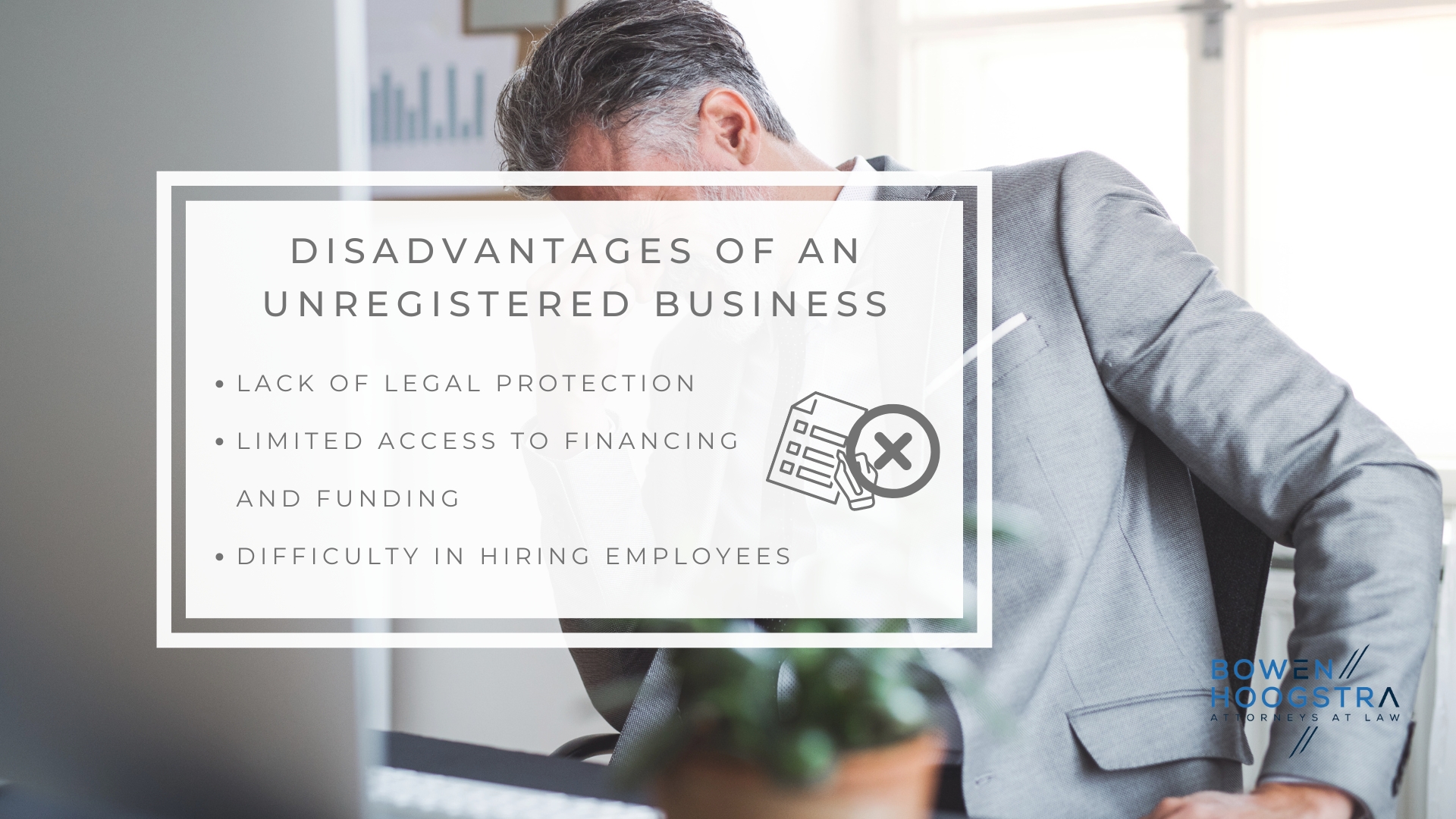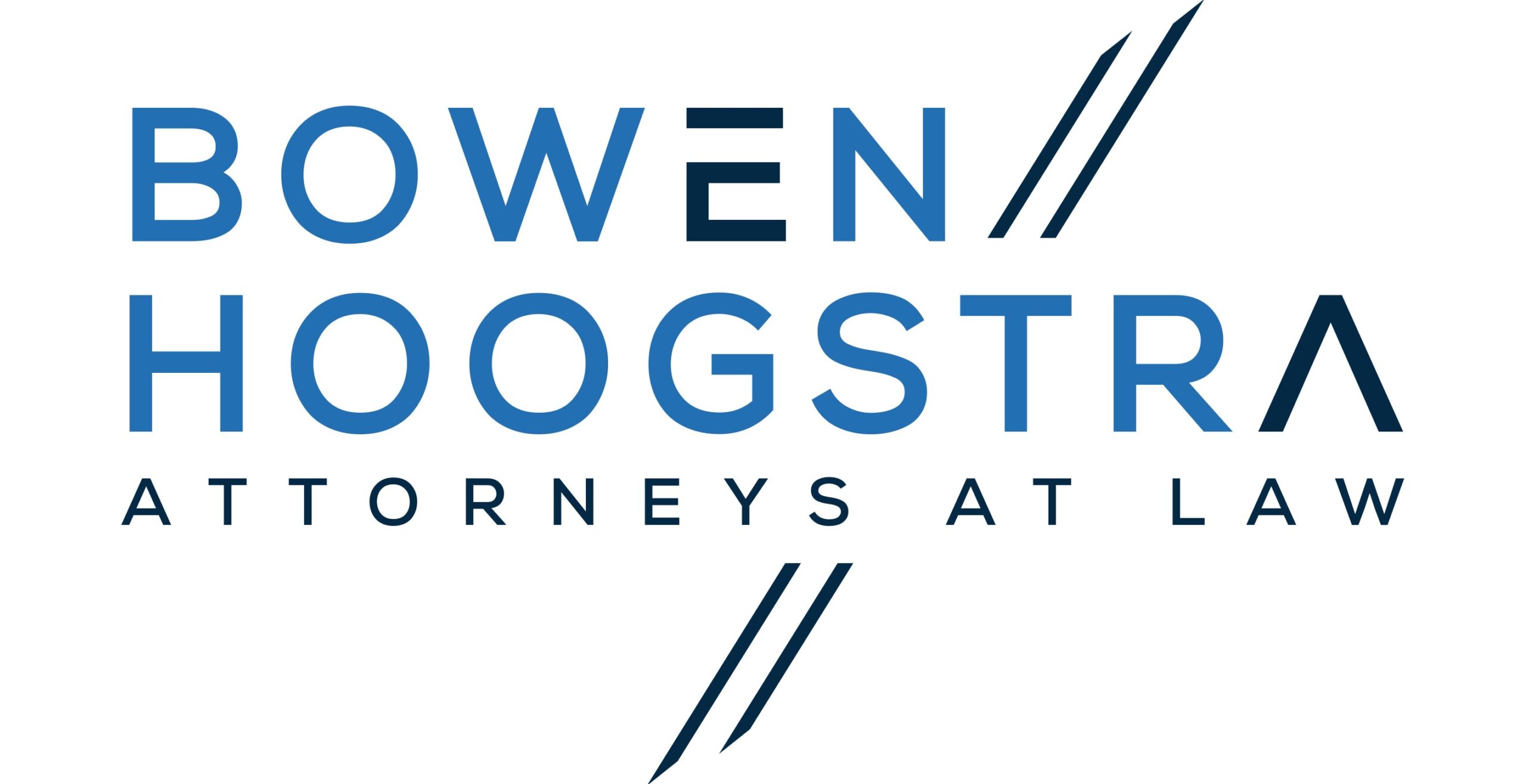One of the questions that often arises when starting a business is, “Can I start a business without registering it?” The short answer is yes. However, while it is possible to operate an unregistered business, it’s important to consider the advantages and disadvantages before making your decision.
In this article, our Muskegon business lawyers will discuss the pros and cons of business registration, including the risks associated with operating an unregistered business, and some alternative business structures to consider.
- Why People Don’t Register Their Business
- Disadvantages Of An Unregistered Business
- Risks of Starting an Unregistered Business
- Alternatives to Registering a Business
Why People Don’t Register Their Business
There are several reasons why individuals may choose not to register their business. Here are some of the advantages associated with operating an unregistered business:
Cost Savings
Operating an unregistered business saves you from paying various fees, including filing fees, legal fees, and other administrative fees. Additionally, you can save money on the professional costs of employing a qualified business lawyer to handle your business’s legal requirements. By avoiding the registration process, you can minimize your expenses, especially in the early stages of your business when finances are tight.
Less Paperwork and Bureaucracy
Registering a business entails dealing with paperwork, legal formalities, and government agencies to ensure that all regulatory requirements are met. Some standard paperwork required for business registration includes business names, licenses, permits, tax registration, and other annual reports. However, not having your business registered allows you to bypass these administrative processes and focus more on building and growing your business.
Flexibility
Starting an unregistered business provides you with greater flexibility. You have the freedom to test your business idea without committing to the formalities and legal obligations associated with registered entities. This flexibility can be particularly beneficial, especially if you want to explore a business concept on a smaller scale or as a side project.
Disadvantages Of An Unregistered Business
While there are advantages to starting an unregistered business, there are also several disadvantages that entrepreneurs should consider. Here are some of the most crucial examples:

Lack of Legal Protection
An unregistered business has no legal entity status, meaning there is no legal distinction between the business and its owner. In the event of legal issues or financial liabilities, the owner’s personal assets may be at risk. Registering your business as a separate legal entity provides a level of personal liability protection.
Limited Access to Financing and Funding
Unregistered businesses may find it challenging to secure financing or funding from potential investors. Banks and financial institutions typically require proof of business registration when considering loan applications. Business registration increases your credibility and opens doors to various funding options and business incentive programs.
Difficulty in Hiring Employees
Running an unregistered business can make it difficult for you to attract and hire employees. Potential employees often prefer working for registered companies that offer stability, legal protection, and benefits such as health insurance, retirement plans, and other perks. By registering your business, you create an environment that is more attractive to qualified candidates and can foster a sense of trust and professionalism.
Risks of Starting an Unregistered Business
It’s essential to be aware of the risks involved with operating an unregistered business, which may include:
Fines and Penalties
Business registration is mandatory in certain states, including Michigan. To operate legally, you must register your business with the Michigan Department of Licensing and Regulatory Affairs (LARA). In addition to state registration, you may also need to obtain local permits and licenses, where the requirements may vary depending on your business structure and location. Failing to do so can result in fines and penalties imposed by government authorities.
Legal Liabilities
Without the legal protections provided by business registration, you may be personally liable for any debts, lawsuits, or damages incurred by the business. For instance, if a dissatisfied client decides to take legal action against your business, your personal savings, property, and other assets could be at stake to satisfy any resulting financial obligations.
Reputation Damage
In running a business, reputation is everything. Operating without business registration can negatively impact your reputation. Customers and clients may question the legitimacy and professionalism of your business, as well as the quality of services and products it offers, which can lead to a loss of trust and potential business opportunities.
Alternatives to Registering a Business
If you are hesitant about registering your business but still want to enjoy some legal protections, there are alternative business structures to consider:
Sole Proprietorship
A sole proprietorship is the simplest form of business entity you can operate without the need for formal business registration. While it doesn’t provide the same level of legal protection as a registered entity, it does offer some advantages, such as minimal paperwork, complete control over the business, and simplified tax reporting. As a sole proprietor, you are your business, meaning you are held liable for your business debts and obligations.
Partnership
If you are starting a business with one or more partners, you can consider forming a partnership. Partnerships can be registered or unregistered, depending on the jurisdiction. Under the Uniform Partnership Act (Act 72 of 1917), Michigan partnerships are not required to register with a specific state agency.
In an unregistered partnership, the business operates under an agreement between the partners, outlining their rights, responsibilities, and profit-sharing arrangements. Having a clear partnership agreement in place is important to avoid future conflicts.
Cooperative
A cooperative is a business structure owned and run by a group of individuals who share common interests and come together to meet common needs. Cooperative members pool their resources and share in the profits and decision-making. The board of directors is chosen among members to represent and run the business.
Cooperatives can operate without formal registration, but some jurisdictions offer registration options that provide certain legal benefits. In a cooperative, shareholders or members enjoy limited liability for debts and other obligations, including unlawful acts of another member of the cooperative.
Make Your Business Legal With Bowen Law
Before deciding whether to register your business in Michigan or not, it is best to seek legal advice from an experienced Muskegon business lawyer to navigate the options and determine the best structure for your specific circumstances. Still, the safest way to start and operate your business is to have it registered, which can be a challenging, complicated process.
We at Bowen Hoogstra Law have the finest Muskegon business lawyers who can guide you through the intricacies of business registration and ensure that your business adheres to the necessary legal guidelines, protecting both your business and personal assets while minimizing the potential legal risks. Call us now at (231)-726-4484 or contact us here to schedule a consultation.

